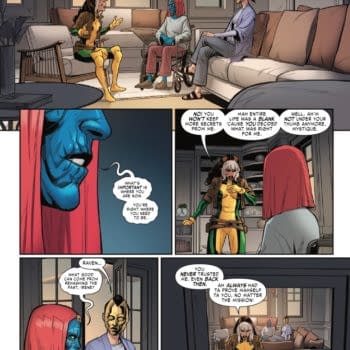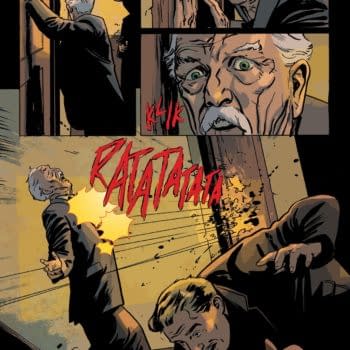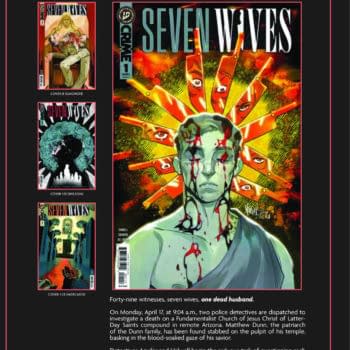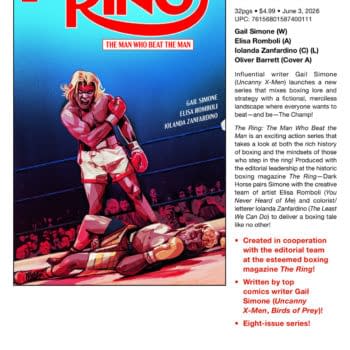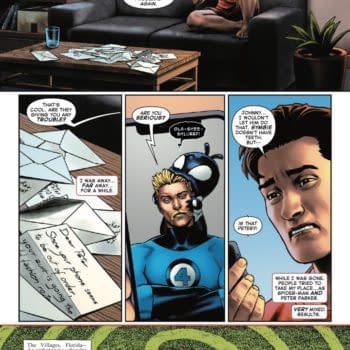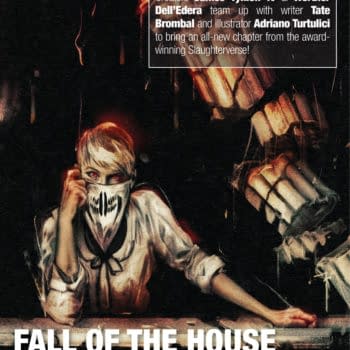Posted in: Comics, Recent Updates | Tagged: Abe Sapien 12, B.P.R.D., Comics, dark horse comics, entertainment, Max Fiumara, mike mignola, scott allie, Sebastian Fiumara
Scott Allie Talks To Bleeding Cool About A Much Darker Abe Sapien Story In Issue #12
We've gotten to know Abe Sapien through the pages of Hellboy and B.P.R.D, and his character, as well as our knowledge of him, has evolved over time, but particularly through his dedicated series that launched in 2013, we've gotten to see him in the spotlight and puzzle out the mysteries of his personality and motivations. Now, with Abe Sapien #12 coming in May, a new storyline begins that pits Abe against some of the darker aspects of humanity as a world-wide apocalypse in the Hellboy Universe gets underway, and issue #12, particularly, has been crafted to challenge the reader's expectations of what an Abe story can or should be like. It's a story of human deprivation and predation, a psychological tale steeped in Biblical and mythic tones.
Editor-in-Chief at Dark Horse Comics and co-writer on the comic, Scott Allie, spoke with us here at Bleeding Cool about what makes issue #12 so unusual and the ways in which it sets up a new arc that will eventually be collected under the title Sacred Places.
Hannah Means-Shannon: How would you describe the most essential characteristics of Abe Sapien and how has having his own dedicated line of comics helped develop his personality for readers?
Scott Allie: Some of my favorite B.P.R.D. stories were when Abe went off solo or semi solo, like Plague of Frogs and Garden of Souls. The biggest difference between Abe and Hellboy is that Abe has been more genuinely curious about his own origins and what those origins mean. He's sensitive and curious—although not psychic—that was the movie, and I've seen reference pop up about that in some reviews. Comics Abe is not psychic. In a solo story, Abe's curiosity can roam around a bit.
What's fun in this story is that Abe says he's looking for answers, but I don't think it's a spoiler to say that he's really in denial, and running from the truth. People think he's responsible for the apparent end of the world, and he hasn't wanted to look at that possibility. Hellboy was always up front about his lack of interest in what he is and how he came to be. But that whole Beast of the Apocalypse thing was somewhat abstract, and in the future. But now the world is ending, and what they're saying Abe is guilty of is more imminent and therefore more terrifying.
HMS: As a reader, I would actually say that one of Abe's traits seems to be compassion, much more even than other characters in the Hellboy universe. Is that something you want to bring across to readers in this significant issue?
SA: I don't know that any of Mike [Mignola's] heroes really lack compassion, but in terms of Abe, that's a significant trait in these stories in that by demonstrating his compassion he hopes to prove his humanity.
HMS: This story seems to be told in very bold, almost mythological terms in terms of its narrative movement. How does that help readers understand the aftermath of apocalyptic events in the Hellboy universe?
SA: We're not quite in the aftermath yet—we're in the thick of it. The apocalypse has apparently begun, but the B.P.R.D. is still trying to stop it. We felt that living during these times, people would be drawn toward some big ideas—like Abe, they would question the meaning of their lives, and seek answers. So we have cults popping ups, messiahs and mystics. The arc that kicks off with this issue, Abe #12, will be collected in a book called Sacred Places. The biblical tone is deliberate, for sure.
HMS: There are plenty of Biblical motifs in this issue. Why are references to Eden and Noah so important to telling this story?
SA: The Noah one jumped in on the spur of the moment, picturing the antagonist perched atop his crumbling house, but then I realized the significance of water to Abe. But Eden, and the Garden, will be a recurring theme in the series. In all there'll be three stories called The Garden, because a lot of people are looking for some point of respite, shelter from the storm. There was a garden when the world began; will there be one now?
HMS: This story is one of the most psychologically close-up narratives I've read among Hellboy universe books. In fact, that's very emotive and insists that the reader can't keep their distance from these characters. What were your goals in making this story so psychological, particularly in terms of trauma?
SA: I just had the idea for this particular way to tell a story—that's where it started. I felt like I hadn't seen this in comics. Probably I just hadn't seen this done, but I'm sure someone has. It grew from the idea of alternating voices in narration, and the more I thought about it, the more drawn I was to getting really in deep to the minds of two people—particularly two people that the reader hasn't met before. I have a side job as an editor on a short story magazine, Glimmer Train Stories, and so I liked the idea of doing something where I can use a bit more of a prose approach.
The way we're telling this story, your only knowledge of these guys comes from these images and this narration. Because of how we tell it, you really get intimate with the state of mind these two people, and I thought that was compelling—to get this in-depth this fast with two people who are going to have really different fates, but who'll be very significant to the story going forward. Readers following these titles know Abe very well. Mike and John have fleshed him out into a real three-dimensional character over the years. I wanted to readers to get to know these other two characters—or at least one of them—through a very emotional crash course.
HMS: Can you tell us a little bit about what you were hoping for in terms of artwork on this book and what you think it accomplishes? I notice there's an almost religious-icon feel to facial expressions and also an earthiness in the characters as well as a focus on landscape and the elements.
SA: As usual, Max [Fiumara] has surpassed my hopes and dreams. He and Seba[stian Fiumara] always do. I wanted to make sure that the art didn't just illustrate the prose, that the art played a real counterpoint to the narration. As much text as there is here, I think if you only read this text, you'd get less than half the story. I wanted to work out with Max a way of delivering tons of story through very few panels per page. While writing it, I got the idea to do the New Frontier layout, three panels per page. I asked Max, and he liked it. So it became very important to evoke a lot in each image. And some of these images are pretty simple.
Two things Max brought to it is, as you note, this amazingly nuanced body language. It's like Rodin. Before I could pipe up, Mignola claimed the last three pages, which portray some of the most gorgeous body language I've ever seen in a comic. But it was also Max's idea to give each thread of the story a different art style. It's sometimes subtle, but Max really brilliantly came up with three different art styles for the story, reflecting the different characters and the way we slip in and out of present tense. Then Dave boosted that effect by bringing really different color styles. The thing I initially set out to do, to tell something really rich in 66 panels, only became possible through these guys adding an incredible layer of nuance to it. This thing would have fallen flat, I think, with lesser cartoonists.
HMS: How does this story fit into previous Abe Sapien stories and Abe's future in comics?
SA: Well, as you say, Abe has a lot of compassion. He's been mistreated and severely changed by this changing world. These two characters he meets in #12 have had it a bit worse than him. How he reacts to them further defines who he is, how he's responded to this world, and this issue will pose a question for him that he'll be wrestling with for the next ten issues, and maybe longer.
HMS: Do you think this issue is a "game changer" in terms of what people will expect from stories that involve Abe in the future?
SA: I don't know. I think we did something different here. It's definitely led the Fiumaras and me to talk seriously about where to push things in upcoming issues, what else we can do to play with the storytelling.
HMS: One thing that occurred to me is that previously, only a character as iconic and developed as Hellboy could have handled such an intense, enclosed narrative dealing with quasi-religious themes and the need for a hero/savior figure. Is this a coming of age for Abe Sapien stories?
SA: I don't know, I think Mike has gone here with Abe before, with The Drowning, and with Plague of Frogs. Normally he's done it with Hellboy, you're right, but there's an aspect of this in all his characters. I think once you give any one of them this much of a solitary spotlight, it's inevitable that you get pretty intense and quasi-religious. It's built into the world, but as Mike said, after this one we should probably get him fighting some monsters again.
[*Warning: Mild Spoilers in the particular question and answer below. And here is the first page of Abe Sapien #12:]
HMS: Did you have any qualms about bringing a fairly lengthy narrative of abuse and captivity into this story? In some ways, it's a lot darker subject matter than readers might be expecting, and with so much debate about the depiction of violence against women in comics, it is a bit of a minefield to try to handle the subject in a meaningful rather than exploitative way. Did that concern you?
SA: Yeah. It's not what you think of in a Mignola comic. I had the idea quite a while ago, and then the thing in Cleveland happened. That nearly made me decide not to do the story. I was afraid it could appear exploitative of that situation. The image I initially had in my head of the man was actually quite a bit like Ariel Castro. I wanted the man to be of indeterminate race, and I pictured someone with dark curly hair like me, but broad features, so that depending on coloring he could be white, black, hispanic. Then Ariel Castro was arrested, and Max came up with this other design.
I had this story outlined a long time ago, but I stalled quite a bit writing the script. The night that I finally really made progress on the script itself, I got a first pass of about half the narration written, and took a break. I turned the internet back on, went to twitter, and lo and behold, Castro had been killed. That same night. Coincidences happen all the time, there's no magic to them, but they still can leave your head spinning, and that was a weird night for me.
In actually writing the story, I realized that if the man is waiting for the Garden, if he perceives himself and the woman as Adam and Eve, and if he's still infantilized by his father's bad behavior, maybe he'd never actually raped the woman. He's certainly abused her, victimized her, but it seemed realistic, and more appropriate for the Mignola world, if he didn't sexually abuse her. His intent is to protect her. But he's insane, to say the least. I think some people might read this and not feel I've vilified him enough, considering what he's done. But I think we've told a story well, and it's only the first part of a longer story that can eventually be viewed as a whole.
*Stay tuned for a full process piece on the creation of this comic on Bleeding Cool next week!
Abe Sapien #12 will hit shops on May 14th from Dark Horse Comics and its order code is MAR140083
Here are the covers for the Hellboy Universe books being released in May:
Hannah Means-Shannon is EIC at Bleeding Cool and @hannahmenzies on Twitter
















